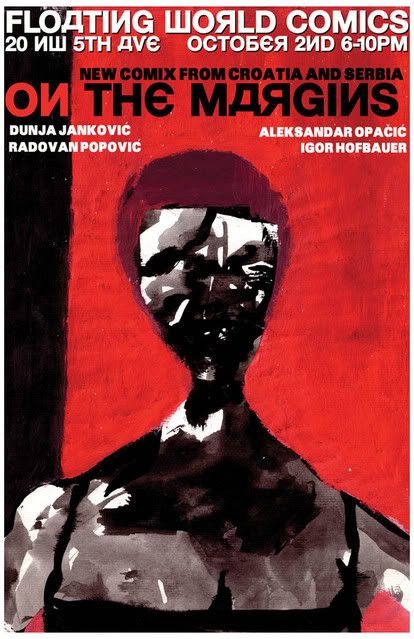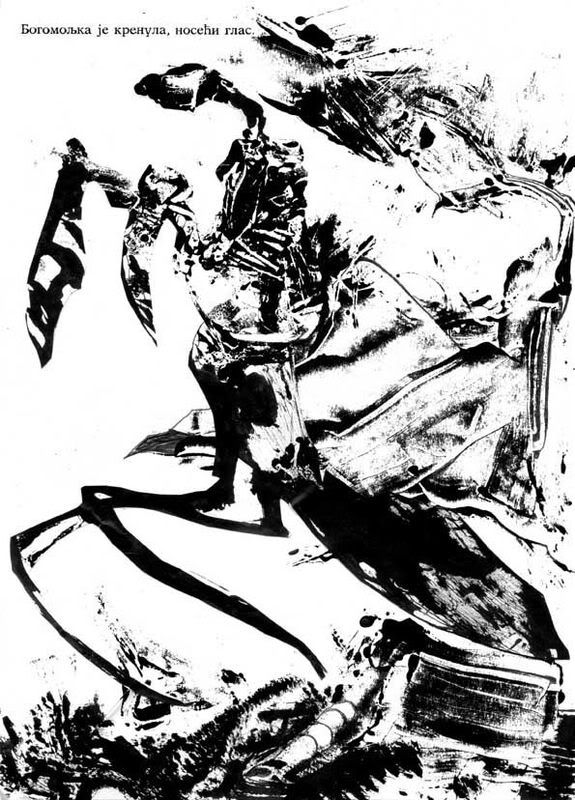
On October’s First Thursday, Floating World will present a gallery show with the work of Igor Hofbauer, Dunja Janković, Aleksandar Opačić, and Radovan Popović, leading artists from comics collectives in Zagreb and Belgrade.
Forged in the social turmoil that accompanied the bloody dissolution of Yugoslavia in the nineties, indie comics and ‘zines (cheap to produce, ignored by the cultural and political establishment, and inherently subversive) became the refuge for underground artists across the region.
Today these collectives have come of age and the artists represented here are producing some of the most exciting work coming out of the fringe of Europe. This show is the first of its kind in the US. Floating World will also be offering books and ‘zines from the region that are otherwise unavailable in North America.
LISTING INFORMATION:
WHO: Igor Hofbauer, Dunja Janković (in person), Aleksandar Opačić, Radovan Popović
WHAT: Gallery show and opening reception
WHEN: Thursday, Oct.
2nd, 6-10PM
WHERE: Floating World Comics
20 NW 5th Ave 101
Portland, OR 97209
(503) 241-0227
Poster (above) by Radovan Popović
Show runs through Oct. 31st
BIO INFORMATION:
IGOR HOFBAUER – Igor Hofbauer (“Hof”) is one of the most recognizable artists working in the ex-Yu today. Living and working in Zagreb, Croatia, he developed his signature wood-cut-esque style and propensity for lurid, underworld stories as the graphic artist for Močvara, a famous Zagreb club. Concert posters turned into album covers and some winning illustrations for underground writer Edo Popović, and eventually Hof turned his eye to comics.
He’s regularly published by Komikaze (www. komikaze. hr) and Stripburger, and recently has had a slew of gallery shows across the Balkans.

http://www. gonebald. net/extrastuff/hof/igor_hofbauer. htm
http://www. komikaze. hr/index. php?issue=18&author=igor%20hofbauer&action=showPages
DUNJA JANKOVIĆ – Growing up on an island in the Adriatic, later attending the art academy in Zagreb and then moving to New York to do a graduate degree in illustration and comics at School of Visual Arts (where she worked with such folk as Gary Panter and David Sandlin), Janković’s comics are fantasies, equal parts breezy and horrific, flights of fancy, and a girl’s daydreams of the ocean and all the irrational flotsam to be found when once can escape the city’s grid. Recently she published Agony! The Story of a Girl Who Didn’t Know How to Find Her Way Out of a Situation! (published by Fabrika Knjiga, Belgrade). She also publishes regularly with Stripburger and Komikaze.

http://www. tripica. org
http://www. komikaze. hr/index. php?issue=18&author=dunja%20jankovic&action=showPages
ALEKSANDAR OPAČIĆ – Opačić (aka Profesor) completed his coursework in the painting department of the Academy of Fine Arts in Belgrade in 1999. Although he had been a comics fan since boyhood, he didn’t start drawing his own comics until he finished with the academy and, eligible to be drafted into Milošević’s army, went into hiding to avoid the draft. Shortly thereafter, NATO bombs rained down on Serbia and Opačić found himself with a lot of free time for drawing. His work tends is often wordless, most often featuring lost or hunted characters in caught in gritty cities and surreal landscapes.
He is a member of the Belgrade multi–media collective, Kosmoplovci (www. crsn. com/studiostrip), has published extensively in Serbia as well as with Komikaze in Croatia, Stripburger in Slovenia, and Cestbon in Sweden.

http://www. crsn. com/opacic
http://www. komikaze. hr/index. php?issue=14&author=aleksandar%20opacic&action=showPages
RADOVAN POPOVIĆ – Radovan Popović (aka Rashid), the de facto leader of Kosmoplovci, has been at the center of the Serbian comics scene for over a decade working as a visionary editor, organizer of many comics festivals and events, a dedicated and talented artist, co-founder of Beopolis (the largest bookstore for alternative comics in Belgrade), and as a spokesman and all-around cheerleader for comics. Interestingly, though Popović had been one of the most prominent figures in the Serbian comics scene through the nineties, he didn’t begin seriously drawing his own comics till 1999. Since that time, however, he has drawn literally thousands of pages which spill out of boxes and shelves, reducing the floor in his bedroom/studio to one narrow path from door to drawing table. His work tends in two directions: spontaneous, playful and short comics, often well steeped in irony, and dark, psychological, expressive, labor–intensive longer works which often combine drawing with painting and collage. Most recently, Popović published Šaka (The Hand, 2007) based on the Philip K. Dick short story “The Electric Ant.
“

http://www. komikaze. hr/index. php?issue=14&author=radovan%20popovic&action=showPages
Komikaze’s website: http://www. komikaze. hr/
Komikaze English introduction page: http://www. komikaze. hr/wiki/pmwiki. php?n=Komikaze. English
Studiostrip/Kosmoplovci: http://www. crsn. com/studiostrip
Additional info:
Yugoslav independent comics didn’t register on the radar of readers in the West till the nineties when some little comics (most notably those of Aleksandar Zograf), clinging to the underbelly of the Big Serious News stampeding out of the region, found their way into Western publications. Individuals were speaking out from these “dangerous places,” recording their own stories, exploring the dirty corners of dark times, and reinventing comics in a time and place when everything was turned on its head. These comics spoke to a generation for whom day-to-day life was probing new depths of absurdity as inflation rendered currency valueless, communists became rosary-toting folk heroes, war criminals became pop stars, dictionaries were rewritten, borders were redrawn and cemeteries sprouted up like mushrooms. Furthermore, they did so in an accessible, unprepossessing (and often underestimated) medium perfectly suited for conveying the voice of the counter culture. As the nineties dragged on, more and more inspired individuals flocked to the comics scene to vent, find community, and, it turns out, create some of the most vital, dynamic, intelligent and engaging comics appearing anywhere in the world. In a Darwinian twist, isolation and adversity brought the oddballs and outsiders to the top of the heap and by the end of the nineties, underground artists had a strong edge over the mainstream.
Now it’s a brave new century, the dictators have been toppled, the curtains lifted, and the independent comics artists from Serbia and Croatia find themselves a little more ripened, yet still armed with a practiced distrust and cynicism, humor (of the gallows sort), and an abiding sense of community. In this future of “bright tomorrows,” they’re up against more insidious beasts than dictators and bombs: “transitional economies” (which usually means losing your social benefits while rich foreigners buy up your property). The artists in this show represent the cutting edge of the Croatian and Serbian comics scenes. They’ve cut their teeth in isolation and adversity and set up a working culture that exists outside of the market and transcends borders. With the help of the internet, these artists from their perch on the periphery have begun to infuse the world comics community with their energy and innovative approaches to comics. This is the first show to bring this work to audiences in the US.
Interview with Dunja Janković – Stripburger 46 (Oct. 2007):





